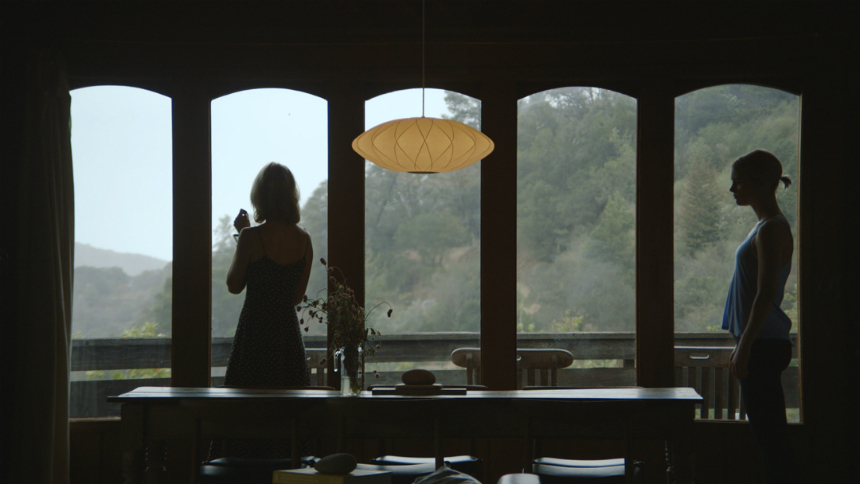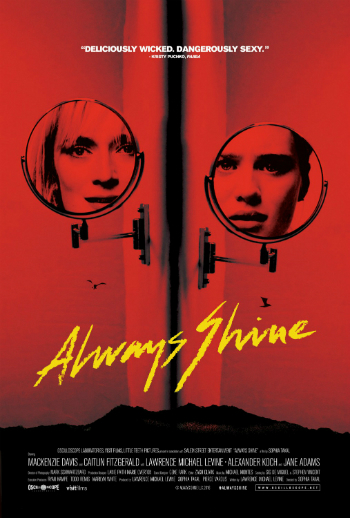Review: ALWAYS SHINE, an Intensely Personal and Satisfying Genre Picture
Mackenzie Davis and Caitlin FitzGerald star in Sophia Takal's ALWAYS SHINE, a dramatic treatise on the tyranny of the male gaze.

Director Sophia Takal more than fulfills the considerable promise of her debut Green with her second feature, a film that often looks, acts and feels like a thriller/horror flick, but at its heart is a dramatic treatise on the tyranny of the male gaze, and how the Hollywood dream factory enables and perpetuates it.
In cinematic terms, it's Persona meets The Shining meets Mulholland Drive meets Single White Female. In literary terms, it's The Day of the Locust meets The Feminine Mystique. However, despite her film’s clearly discernible antecedents, Takal comes strongly through with a voice and a style all her own, one that combines creeping dread and flashes of overt violence with a finely pitched touch of barbed satire aimed at the conventions and clichés running rampant in both Hollywood and indie films. Takal and her screenwriter/co-producer (as well as husband) Lawrence Michael Levine are particularly sharp at pinpointing how these conventions and clichés serve to cruelly trap women within them, as they are forced to conform to this sort of image making.
Always Shine carries over the themes of jealousy and competition between women that were such a crucial component of Green, but here it’s placed in a more explicitly genre-based framework. The central characters are two women whom we see progress alarmingly quickly from friends, to frenemies, and then finally to just plain enemies.
Beth (Caitlin FitzGerald) is an up-and-coming actress on the rise; she may be doing schlocky horror flicks now, but she’s getting steady work and has a bright future ahead, and has even been included in an industry journal’s “Young Hollywood” issue. On the other hand, Beth’s friend Anna (Mackenzie Davis), also an actress, seems to be stalled in her progress, and may even be on a downward trajectory; she’s asked Beth to send her acting reel to Beth’s agent, in the hopes of taking her on as a client.
Our introduction to the two women sets up important contrasts between their personalities and temperaments; the first two scenes open with extreme close-ups of their faces, making these scenes seem at first like audition reels, but which lead to very different outcomes. Beth performs a tear-filled monologue from a horror script, in which she begs an attacker not to kill her, offering anything he wants, even her body if need be.
Afterward, the two men auditioning her repeatedly stress the “extensive nudity” required for the role, continually asking her if it’s OK with her, less for her comfort level than to prevent any conflicts that the filmmakers will have to deal with. “We’ll make sure you look beautiful,” the men say. Much like the heroine she’ll be playing in the movie, Beth meekly submits.
 Everything here seems innocuous on the surface, but the stark and unnerving way the scene is edited and shot – complete with the title of the film displayed across the screen in a blood-red splash – reveals a sinister undercurrent, one which exposes the commoditization of women, and their bodies and physical appearance specifically, that is such a rampant part of the film industry.
Everything here seems innocuous on the surface, but the stark and unnerving way the scene is edited and shot – complete with the title of the film displayed across the screen in a blood-red splash – reveals a sinister undercurrent, one which exposes the commoditization of women, and their bodies and physical appearance specifically, that is such a rampant part of the film industry.
Anna’s introductory reel, on the other hand, turns out to be not for an audition but for a real-world situation; she’s arguing with a mechanic over unauthorized repairs that will make her bill much more than she bargained for. As opposed to Beth’s passivity, Anna goes on the offensive, laying into the mechanic (who’s initially an offscreen male voice) for what she feels are his attempts to cheat her.
Pertinent to the theme of men’s expectations of women’s proper behavior affecting the way women are treated, the mechanic tells Anna he won’t yield to her demands to have the extra charges erased because “quite frankly, I don’t like your attitude.” If she were “a touch more ladylike,” he’d be more amenable to negotiating the price. It later becomes clear that a big part of the reason that Anna isn’t doing better career-wise is this refusal on her part to be a doormat for men, or to go along to get along.
With their opposite career trajectories being the main source of tension between these two women, Anna invites Beth over to a large secluded house near the shores of Big Sur where Anna’s house-sitting for a friend. This seems to be their attempt to reconnect with each other and salvage their strained friendship. However, it quickly becomes clear that this is a doomed quest, as Anna’s jealousy and Beth’s passive-aggressive acts of subtle sabotage – she lies about sending out Anna’s reel and neglects to tell Anna about an avant-garde short filmmaker’s offer of work – bring their old conflicts back to the surface.
The two women’s deteriorating friendship is most starkly, and unnervingly, demonstrated in an extraordinary scene about midway through, shot in one sustained take, which showcases the talents of the two great actresses at its center, as well as Takal’s considerable skill at directing them. Soon after hearing that Beth’s landed a lead role in a horror flick – with a silly-sounding plot involving trolls, magic rocks, and a serial killer that probably won’t rival Ingmar Bergman – Anna offers to help Beth run lines from the script.
Under the thin guise of this help, Anna’s jealousy of Beth’s latest career advancement – notwithstanding Beth’s demurrals about how terrible the script is – and Anna’s feelings that Beth isn’t really deserving of her success comes strongly through. After sharply criticizing Beth’s flat line readings – for a role that calls for Beth to play a “sassy” heroine – Anna reads Beth’s role, elevating the bad writing with sheer conviction and bravura brio, demonstrating to Beth her superior talent. After telling Beth, “That’s how you play sassy,” she gives Anna a quick kiss, which is less like a kiss between friends and more like the kiss Judas gave to Jesus before delivering him into the hands of his crucifiers.
All of this sets the stage for an eruption of violence that turns the film into a radically different direction, one which not only fulfills the normal expectations of the thriller/horror genre, but which transcends and interrogates them. To borrow part of the film’s title, this is where Takal and her collaborators truly shine. Zack Clark’s razor sharp editing, utilizing shock-cut flash-forwards, Mark Schwartzbard’s striking widescreen compositions employing the full breadth of the frame for maximum tension, and the eeriness of Michael Montes’ musical score and Gene Park’s sound design provide unerringly solid support for Takal’s superb orchestration of all these elements. With the crucial aid of Lawrence Michael Levine’s clever screenplay, this all creates the heady experience of a movie which seemingly reinvents itself with each successive scene.
For all these reasons, Always Shine augurs well for the future career of its director, who has succeeded in creating a film that works equally well as a satisfying genre piece, as well as an intensely personal auteurist work.
Review originally published during the Tribeca Film Festival in May 2016. The film will open in select U.S. theaters on Friday, November 25 via Oscilloscope Pictures.
Always Shine
Director(s)
- Sophia Takal
Writer(s)
- Lawrence Michael Levine
Cast
- Mackenzie Davis
- Caitlin FitzGerald
- Lawrence Michael Levine
- Alexander Koch

Do you feel this content is inappropriate or infringes upon your rights? Click here to report it, or see our DMCA policy.






